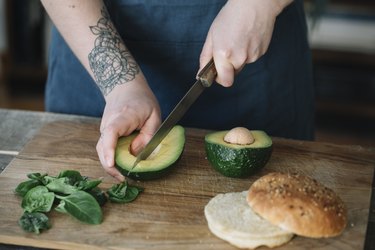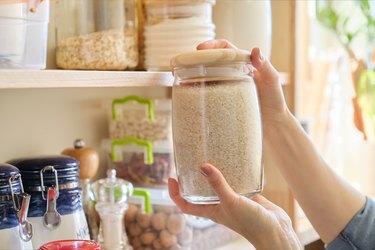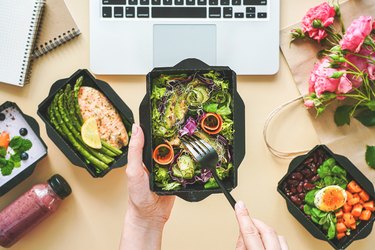
If you want to support your health and our planet's at the same time, eating less red meat and more fruits, vegetables, nuts and legumes is a good place to start.
If your goal is to eat a diet rich in plant foods and fewer animal-based foods, the EAT-Lancet Commission lays out recommendations for a global, plant-based food plan to simultaneously improve human health worldwide and double down on environmental sustainability. It seems like a win-win.
Video of the Day
Video of the Day
There's one problem, though: A staggering 1.6 billion people can't afford the commission's proposed universal diet, per a November 2019 study in The Lancet Global Health.
So, how can you do your part to protect the planet without wrenching your wallet? Here, Frances Largeman-Roth, RDN, a Brooklyn-based dietitian and author of Eating in Color: Delicious, Healthy Recipes for You and Your Family, shares how to eat a plant-based diet on a dime.
1. Buy Canned Legumes
Largeman-Roth suggests packing your pantry with affordable beans, which cost around 99 cents per can. Stock up on canned legumes when they're on sale, and just make sure the "best by" date is at least six months out.
"I keep a variety of canned beans and lentils on hand for weeknight meals, especially during the winter when I make soup," she says. "They are an excellent source of plant protein, as well as fiber and other nutrients."
To make your beans even better, opt for low-sodium varieties or just rinse them a few times to reduce their salt content.
2. Stick With Seasonal Veggies
Locally grown seasonal vegetables are generally the cheapest options in the produce section, says Largeman-Roth. That's because, often, out-of-season veggies must be shipped from overseas, so you incur that extra cost when you buy them.
For an even better bargain, buy in bunches. "You can usually find deals when you buy seasonal veggies in larger quantities, such as two pounds of Brussels sprouts for $7 or two bunches of organic carrots for $4."
Worried all that food will spoil? "Even if you're only cooking for one or two people, you can roast the veggies, toss them in a casserole or quiche and freeze them for up to three months in an airtight container," Largeman-Roth says.
3. Favor the Frozen Food Section
For reasonably priced produce, head to the freezer aisle. Not only are frozen fruits and vegetables cheaper than the fresh stuff, but they're just as nutritious.
"Frozen fruits and vegetables are picked at their peak of ripeness and flash frozen, so the nutrients are sealed in," says Largeman-Roth. Plus, frozen veggies save you a ton of time (especially during busy weeknights), as they come pre-washed and chopped.
The best part for the planet: There's no waste. Use only what you need and store the rest in the freezer.
4. Go for the Generic
Brand names aren't always better. Often, the only difference between a branded food item and its generic counterpart is fancy packaging, Largeman-Roth tells us.
That's why you shouldn't be hesitant to experiment with less expensive generic alternatives, which can save you big bucks, especially when it comes to whole grains and canned foods.
For example, generic nut butters — which usually cost significantly less — can be just as good as brand-name nut spreads as long as they're not rich in added oils or sugar, says Largeman-Roth. Always check the nutrition label to make sure your spread has one ingredient: nuts (a bit of salt is OK, too).
5. Buy in Bulk
If you have room in your pantry, stock up on non-perishable staples.
"You can find dry beans, quinoa, oats and other whole grains in bulk at cheaper prices than the boxed versions," says Largeman-Roth. "Just make sure to transfer these items to airtight containers when you get home and mark them with their purchase date."
Most whole grains will last for four to six months in the pantry and up to eight months in your freezer, Largeman-Roth says. "But if you're buying nuts in bulk, you must store them in the freezer — their high fat content means they can become rancid at room temperature."




